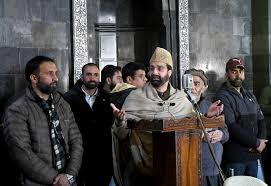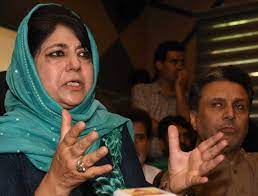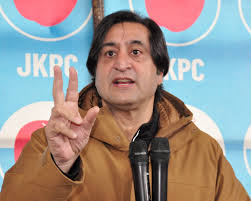Taking jibe at the Congress, Citing Mirza Ghalib’s poetry “ki mire qatl ke baad us ne jafa se tauba” (After she had slain me then from torture she forswore) Union Minister Jitendra Singh Said, “For 60-70 years, those who did not implement the Constitution of India in Jammu and Kashmir, today they are teaching those who sacrificed 3 generations so that the Constitution of India should be implemented in Jammu and Kashmir.”
Amid a chorus from the opposition benches that the Centre restore statehood to Jammu and Kashmir and set a time frame for holding Assembly elections there, Union Minister Jitendra Singh said on Tuesday that Congress did not implement the Constitution of India in Jammu and Kashmir and now they are teaching us.
Taking a jibe at the Congress, Union Minister Jitendra Singh Said, “For 60-70 years, those who did not implement the Constitution of India in Jammu and Kashmir, today they are teaching those who sacrificed 3 generations so that the Constitution of India should be implemented in Jammu and Kashmir.”
“As early as the 1947 Constituent Assembly, Shyama Prasad Mukherjee had raised concerns about Article 370 and called for its review. He urged for a gradual approach to address the issues surrounding Article 370,” added Jitendra Singh.
Union Minister Jitendra Singh said that Congress party should commend Prime Minister Modi’s efforts for abrogation of Article 370.
“The issue of Article 370 has been politicized and exploited by vested interests for generations, allowing them to maintain their grip on power. The Congress party should commend Prime Minister Modi’s efforts to address this issue, which previous governments had failed to do,” said Union Minister.
Speaking on the history of Jammu and Kashmir during independence, Jitendra Singh said, “One of the consequences of what historians have termed the “Nehruvian Blunder” was the delayed integration of Jammu and Kashmir into India in 1947. Nehru’s belief that he had a better understanding of Jammu and Kashmir than his own Home Minister, Sardar Patel, contributed to this delay.”
“Nehru’s response to Mukherjee’s concerns about Article 370 was dismissive, assuring him that the issue would gradually resolve itself. Decades later, during a 1963 debate on the floor of the House, Prime Minister Shastri also echoed this sentiment. In 1963, Pandit Nehru himself acknowledged the need to address Article 370. However, neither Nehru nor subsequent governments took concrete steps to repeal Article 370, allowing it to become an entrenched political issue,” he added.
Speaking on Shyama Prasad Mukherjee’s arrest and highlighting the absence of habeus corpus writ, Union Minister Jitendra Singh said, “Shyama Prasad Mukherjee was arrested en route to Kashmir in 1953. The arrest, which took place outside the jurisdiction of the Supreme Court, was allegedly orchestrated by Nehru’s government to prevent him from reaching Jammu and Kashmir.”
Meanwhile, BJP MP from Ladakh, Jamyang Namgyal, on Tuesday made a strong case for status quo to continue under the UT administration saying that the erstwhile state needs peace, security and progress more than polls.
The discussion on two Bills on the Union Territory of Jammu and Kashmir in the Lok Sabha, on Day 2 of the ongoing Winter Session of Parliament, saw a heated debate between the Treasury and the Opposition benches, with veteran TMC MP Saugata Roy demanding that the Centre set a definite time frame for holding Assembly polls in the UT.
Countering the TMC MP and other Opposition members, Namgyal said, “Former chief minister of Jammu and Kashmir, Farooq (Abdullah) ji, is here, and with all due respect, I want to ask him: How many elections have you witnessed in your lifetime? Has there been a single election that was conducted peacefully, without guns and bombs going off and lives lost?”
Quoting Prime Minister Narendra Modi, Namgyal said “only if there’s life, there is a world”, adding that the Union Territory needs peace and security more than elections at this point.
“We can’t hold elections by putting people’s lives at risk. There can be no elections at the cost of national security or public safety,” the BJP MP argued.
In a swipe at previous regimes in the erstwhile state, Namgyal said, “Back in the day, one was terrified visiting Kashmir, especially the South Kashmir region which used to be the hotbed of militancy and terror. At the back of our minds, there used to be a gnawing fear that we might not return alive. In a region where guns rang out and bombs went off previously, there’s a reign of peace now. Shooting guns have now been replaced with film shoots. Even the people of South Kashmir would endorse my words. At a place where curfews had to be enforced for months on end, shop owners now stay open days and nights without any disturbance.”
Several members took part in the debate in the Lower House on Tuesday and Union Home Minister Amit Shah is expected to give his reply on Wednesday.
Taking turns at addressing the House during the debate, Opposition members accused the government of delaying elections in Jammu and Kashmir, adding that while the Centre was claiming a significant improvement in the law and order situation in the erstwhile state, it was dragging its feet on holding the assembly polls.
The Lower House took two Bills–the Jammu and Kashmir Reservation (Amendment) Bill, 2023 and the Jammu and Kashmir Reorganisation (Amendment) Bill, 2023– up for discussion and debate on Tuesday.
The Union Home Minister tabled the two Bills for consideration and passage in the Lok Sabha. The House took the two Bills up for debate together.
Participating in the debate, National Conference MP Hasnain Masoodi said the draft legislations should not have been introduced at this stage, as the Supreme Court was yet to announce its verdict on the petitions challenging the Jammu and Kashmir Reorganization Act.
He said the decisions on matters, being sought to be amended by the Bills, were taken by the erstwhile Assembly and any changes should be made there.
The proceedings in both the Houses were subsequently adjourned till 11 am on Wednesday. (ANI)






